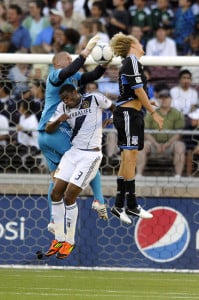Last Saturday night, Stanford Stadium played host to a different sort of football.

Though the yard lines were still clearly visible under green paint, the stands were packed with soccer fans massed to watch the San Jose Earthquakes defeat the Los Angeles Galaxy 4-3 in a heated rivalry game.
That the Quakes went into the break trailing the Galaxy 2-3 seemed against the run of play for much of the first half. San Jose made several scything runs and passes through the Southern Californian team’s defense, with Quakes striker Steven Lenhart scoring the first goal of the contest and threatening more. Mistakes, though, almost proved costly.
A dangerous free kick conceded just outside the box allowed L.A. midfielder David Beckham to level the match, and an own goal by defender Jason Hernandez gave the Galaxy the lead. Confusion and a poor back pass then led to L.A.’s third tally, as striker Landon Donovan pounced and the vocal San Jose fans were silenced.
For the second time this year, though, the Quakes came back from a two-goal deficit against the Galaxy. A goal either side of halftime, thanks to defender Victor Bernardez and midfielder Sam Cronin, brought them level before striker Chris Wondolowski’s deft back heel in the 61st minute sealed the contest.
The win gives the Quakes a four-point lead in the Western Division and opens a 16-point gap over the Galaxy, the reigning MLS Cup champions.
More than that, though, the contest reinforced perhaps the MLS’s biggest rivalry, the California Clasico. These two teams have faced each other more than any other teams in the league, but a two-year hiatus broke the NorCal/SoCal battle when San Jose’s original franchise was moved to Houston.
“I think the rivalry’s back,” said Los Angeles Galaxy left back Todd Dunivant ‘02. “Both teams are competitive for the championship again, and I think that’s a big part of it. The Earthquakes obviously left for a couple of years and as an expansion team kind of built their team back up. And now they’re at the top of the table, so I think that’s going to add a lot of heat to the rivalry and as we continue to climb the standings, you know it’ll be a good matchup.”
He should know, too. Since graduating from the Farm, Dunivant has played for both teams.
Returning to Stanford, he was greeted by 50,391 mostly hostile fans in a sold-out Stanford Stadium, almost double the capacity of L.A.’s home field.
“It’s amazing,” Dunivant said. “It was a great night for soccer in the Bay Area and particularly for Stanford. I saw the women’s soccer team, the Stanford women’s team, at the national championship on the side. It made me a little jealous we didn’t quite get that on the men’s side. I was happy for them and it’s great to see this here at Stanford and it’s a great event. I wish we could come back again this year.”
Beneath an atmosphere reminiscent at times of South American or European soccer games, emotions boiled over. Galaxy star Beckham—perhaps partly as a result of recent news that he would not represent his country at the Olympic Games in London this summer, and partly annoyed by Quakes players eating up vital seconds at the end of a close game—earned himself a needless yellow card, looping a ball into the apparently injured San Jose player Sam Cronin while the referee tended to him.
“We’re frustrated they’re wasting time,” Dunivant explained. “The referee’s not really aware of it and frustrations boil over.”
In the game’s aftermath Beckham continued to argue with Quakes players, and as he walked down the tunnel he was subjected to both abuse and missiles thrown by local fans. Both are disciplinary problems the MLS may have to deal with, as the supporters’ behavior clearly broke the MLS Fan Code of Conduct. However, it should be noted that Beckham showed a different side after the match, taking time to chat with troops and patiently posing for photographs.
There may, too, be a few bright points in both the fans’ and Beckham’s attitudes. Together they highlight how seriously both fans and players, even those who learned their trade in more illustrious leagues overseas, now take the MLS.
Beckham’s role as villain in this piece will also act to further spice up the California Clasico. When he originally arrived in the United States, it was to popularize the American league. Intentionally or not, this small chapter in the San Jose and Los Angeles rivalry may help do just that.